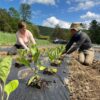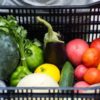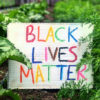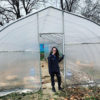The once-every-five-years Farm Bill authorization process is in full swing! This presents an historic opportunity to lower the nearly one third of U.S. greenhouse gas emissions spewed by the food system and reshape food production and distribution toward justice and equity. Join a robust, intersectional movement from a Jewish perspective! There has never been a better time for working together on behalf of our food future. A Just and Climate-Friendly 2023 Farm Bill Could Help the Food System… bring its emissions to net-zero by 2040 adapt to a changing climate prioritize racial justice reduce food waste incentivize land, soil, and water conservation increase equitable access to healthy, fresh food uplift community-led land use and food sovereignty Seven Ways to Take Action with Hazon’s Farm Bill Campaign Building on centuries of Jewish wisdom, Rabbi Abraham Joshua Heschel Z”L said that “The opposite of good is not evil; the opposite of good is indifference. In a free society where terrible wrongs exist, some are guilty, but all are responsible.” Terrible, fixable wrongs exist in the food system. Thirty-five million people in the U.S. confronted hunger in 2019 while 30-40% of food produced was wasted, accounting […]












